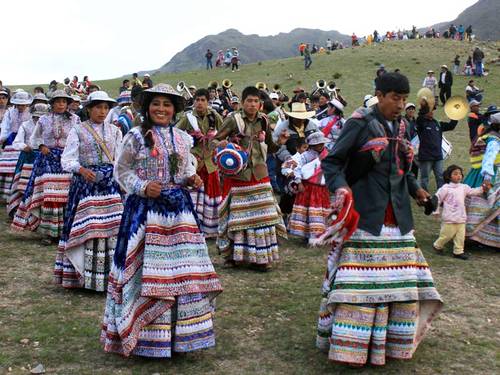Ethiopia to host 11th meeting for the Committee for the Safeguarding of the Intangible Cultural Heritage
The next annual meeting of the Intergovernmental Committee for the Safeguarding of the Intangible Cultural Heritage will take place from 28 November to 2 December 2016 in Addis-Abeba (Ethiopia) and will be chaired by Yonas Desta, Director General of the Authority for Research and Conservation of Cultural Heritage (ARCCH).

Ministry of Culture, 2014La danza del wititi del valle del Colca (Perú)
This decision was taken on Friday in Windhoek at the close of the 10th session of the Committee, which brings together the representatives of 24 States Parties to UNESCO’s Convention for the Safeguarding of the Intangible Cultural Heritage. The Committee decides on measures to safeguard oral traditions and expressions, performing arts, social practices, rituals, festive events, knowledge and practices concerning nature and the universe or the knowledge and skills to produce traditional crafts, which constitute intangible heritage.
In Windhoek, the Committee approved the granting of financial assistance totalling US$90,000 to Malawi for a project to Safeguard Nkhonde, Tumbuka and Chewa proverbs and folktales, which are important to the country’s culture and whose transmission is declining. Aiming to document this heritage, the project foresees the training of six researchers from the Oral Traditions Association of Malawi (OTAMA) to help six field assistants from the communities concerned interview resource people and collect some 30 proverbs and folk tales of the tradition as few of them have been recorded to date.
The Committee defined 12 operational directive recognizing the role that the safeguarding of intangible cultural heritage can play in achieving the 2030 sustainable development goals that the General Assembly of the United Nations adopted in September.
Twelve ethical principles were adopted by the Committee. They aim to prevent disrespect and misappropriation—be it moral, legal or commercial—of intangible cultural heritage. They recognize the importance of ensuring the free and informed prior consent of local communities, respecting the rights of those concerned to full and equitable participation in any process, project or activity that may affect them. They acknowledge the crucial role of communities in maintaining and managing their culture and heritage.
The Committee inscribed five elements on the List of Intangible Cultural Heritage in Need of Urgent Safeguarding out of eight submissions. It also added 23 elements to the Representative List of the Intangible Cultural Heritage of Humanity out of a total of 35 nominations.
Now numbering 48 elements, the List of Intangible Cultural Heritage in need of Urgent Safeguarding helps States Parties mobilize international cooperation and assistance to ensure the transmission of these cultural practices with the participation of the communities concerned.
The Representative List of the Intangible Cultural Heritage of Humanity, now numbering 336 elements, shows the diversity of this heritage and raises awareness of its importance.
Source: United Nations Educational Scientific and Cultural Organization
- 669 reads
Human Rights
Fostering a More Humane World: The 28th Eurasian Economic Summi

Conscience, Hope, and Action: Keys to Global Peace and Sustainability

Ringing FOWPAL’s Peace Bell for the World:Nobel Peace Prize Laureates’ Visions and Actions

Protecting the World’s Cultural Diversity for a Sustainable Future

Puppet Show I International Friendship Day 2020

